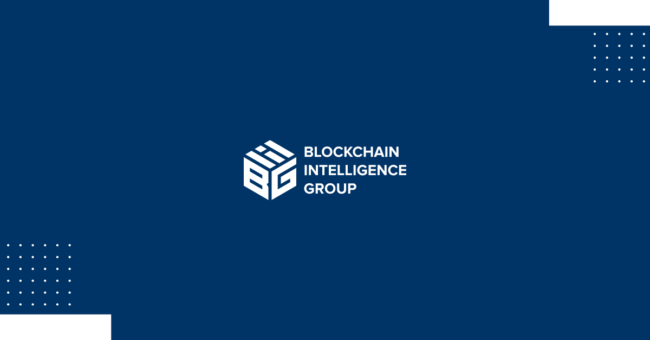Intelligence Experts in the Blockchain and Cryptocurrency Space
Asia Blockchain Review recently spoke to Lance Morginn, CEO of Blockchain Intelligence Group (BIG), a leading developer and provider of blockchain and cryptocurrency search, risk-scoring, and data analytics solutions and investigation services. Morginn talked about using blockchain as a tool to fight crime, forming a team of experts for BIG, working with international partners, the field of cryptocurrency investigation, the company’s tools, and his views on developing a secure network for all stakeholders in the blockchain community.
Asia Blockchain Review: Can you tell us about Blockchain Intelligence Group? What solutions do you provide to your clients?
Lance Morginn: Blockchain Intelligence Group (BIG) brings security and accountability to the new era of cryptocurrency. BIG has developed from the ground up a blockchain-agnostic search and analytics engine, QLUE™, enabling law enforcement, RegTech, regulators, and government agencies to visually trace, track and monitor cryptocurrency transactions at a forensic level.
Our commercial service, BitRank Verified®, offers a “risk score” for cryptocurrency addresses and or transactions, enabling RegTech, banks, ATMs, exchanges, and retailers to meet traditional regulatory/compliance requirements.
Our Forensic Services Division brings our team of investigative experts into action for cryptocurrency investigations that require in-depth expertise and experience, either in conjunction with or supplemental to our user-friendly search, risk-scoring, and data analytics tools.
Based on industry demand, we created our Cryptocurrency Training Academy to help law enforcement, the financial sector, and regulators learn how to bring security and accountability to cryptocurrency. Our Cryptocurrency Investigator Certification Course is a one-stop solution to understanding the world of cryptocurrency, how to reduce associated risk, and investigate cryptocurrency crime. Crypto Fusion Center is a free service that is delivered via API, notifying subscribers of theft, ransomware, and other nefarious addresses.
ABR: Who are the members of BIG’s team and what kind of expertise do they bring to the company?
LM: We employ over 35 people that have experience in the areas of database development, front end UI/UX, Q&A, and network operations, as well as a team of researchers that monitor the surface web and Dark Web for addresses that are associated with nefarious activity.
In management, some of our key people would be Robert Whitaker, who oversaw cryptocurrency investigations when working as a Supervisory Special Agent for US Homeland Security’s Illicit Finance and Proceeds of Crime Unit.
From the financial world, we have Teresa Anaya, who has worked in governance risk and compliance for Money Gram, a money services business (MSB) with a presence in over 200 countries, as well as for Bank of America and Standard Chartered Bank, performing investigations and helping build risk controls into the technology infrastructure.
We also recently hired Kristi Evans with 15+ years’ experience mitigating the risk of fraud, money laundering, and terrorist financing in the financial services industry. Her work with the United States’ Office of the Comptroller of the Currency, Consumer Financial Protection Bureau, and New York State Department of Financial Services included suspicious activity reporting, investigation reports, and executive summaries for global correspondent banks, including Bank of America and Standard Chartered Bank.
Both myself and my partner, Shone Anstey, have been involved in the technology sector for over 25 years.
ABR: How does QLUE enable investigators to fight terrorist financing, money laundering, and human trafficking, among other crimes?
LM: Rather than being anonymous, cryptocurrencies such as Bitcoin and Ethereum are more accurately described asd. While a user’s name is not attached directly to an underlying transaction, the transaction history itself is permanently stored on the cryptocurrency’s public blockchain ledger. The data is technically available for all to see, but it is not easy to know where to look or how to make the connections between the entities behind the transactions involved.
This is why we built QLUE™ — to make it easier to find and assess the information required to expedite investigations, mitigate risk, support compliance, and make informed business decisions. QLUE™ incorporates various techniques and advanced search algorithms to detect suspicious activity within cryptocurrency transactions, use of “Dark Web” tools such as TOR, and other methods commonly employed by criminals to cover illegal activity. The result is a faster and easier search and analysis process that can be developed into actionable data and intelligence related to cryptocurrency addresses, wallets, and the entities associated with transactions.
With growing regulatory scrutiny and the ongoing adoption of cryptocurrencies across investment and payment applications, it will be harder to determine legitimate versus illicit transactions. QLUE™ is the response to that challenge, enabling you to uncover what has really been going on behind transactions.
ABR: What was the idea behind the development of the cryptocurrency investigation course? Who is it for?
LM: After traveling the world and providing on-site training to clients, regulators, and global law enforcement agencies, we discovered a great need for education. A basic understanding of cryptocurrency and blockchain was an immediate need, but we realized that if that was done right, we could actually take a student through the basics onto criminal activity and quickly into the forensic analysis.
The course has been of particular interest to compliance officers, financial institutions, global law enforcement, local law enforcement, tax authorities, intelligence agencies, as well as law firms.
The majority of interest in the course does come from compliance officers, with focus on Anti-Money Laundering (AML), Certified Fraud Examiners (CFE), or Counter-Terrorism Financing (CTF) specialists. The course was originally designed for law enforcement officers and certified for law enforcement continuing education credits in 48 United States. We’ve modified the course, and now offer the course to those in the private sector.
ABR: How does the acquisition of Netcoins Operations fit into your overall roadmap?
LM: The Netcoins opportunity presented itself at the right time. We’ve been eyeing the space with interest for some time. Our services are symbiotic, a natural fit that sets the stage for potential exponential growth, as the combined team seeks to provide greater confidence from an AML and security perspective through tools that can reach the masses. We see our existing clients requiring access to OTC (over-the-counter) pricing, whose needs we will now be able to meet. Furthermore, businesses and consumers are looking for transparency around trades and the back history regarding the source of funds — which our service fulfills.
ABR: Can you tell us about the partnership with SBI BITS? What is your opinion of the development of Japan’s blockchain space?
LM: The Agreement marks the culmination of collaborative efforts between the parties, SBI BITS testing of BIG’s services, and reviewing of data sets, algorithms, and on/off-chain information unique to BIG that sets it apart from its competitors. With BIG’s suite of compliance solutions, SBI is able to execute regulatory compliance for its VCTRADE cryptocurrency trading platform.
SBI has integrated BIG’s BitRank Verified® transaction risk-scoring service into its VCTRADE platform, providing additional AML checks to its rapidly growing client base. Prior to the launch of their VCTRADE cryptocurrency spot trading service, they already had 20,000+ customers registered in advance to open accounts.
SBI also uses BIG’s QLUE™, our cryptocurrency investigation platform service in their forensic investigations into Bitcoin and Ethereum transactions.
ABR: What are the company’s plans for 2019-2020?
Over the next 12 months, the plan is to continue development of our BIG Compliance suite, building advance alerting models and researching and developing automation of attributes. Simultaneously, we will work collaboratively to build out the Netcoins platform.
For our training academy, we are developing additional modules to further educate individuals in specific areas of interest. Our Crypto Fusion Center (CFC) is a free service that was launched this year, and we intend to continue to invite law enforcement and financial organizations.
Lastly, we will continue to converse with and work alongside regulators worldwide as they develop, monitor, and adjust legislation for this new era of blockchain technology.
ABR: How is BIG developing a secure network for all stakeholders in the blockchain community?
LM: Ability and tools. In order for our mission statement to be realized, we believe that regulators must bring in appropriate legislation that provides the oversight, safety, and reduction in risk that will open up cryptocurrencies to usage by the masses. Japan has been leading the way by recognizing Bitcoin as legal tender, which, in turn, has brought greater awareness to the average individual and further fueling the overall industries’ growth.
We want to provide the tools for other nations, organizations, and individuals to participate on a much more level playing field — with a view to ushering in a period where cryptocurrency transactions are on par with your everyday banking transactions.
Ready to Start Investigating?
Our intuitive solutions bring you closer to your goals on the first day.




